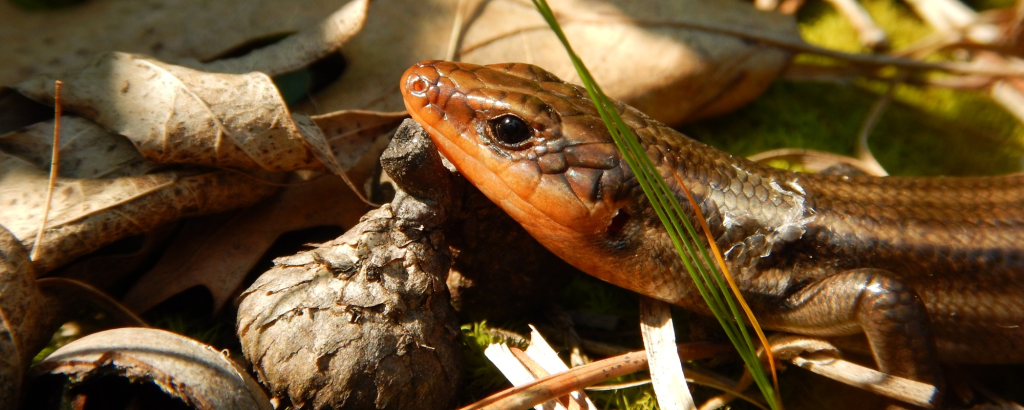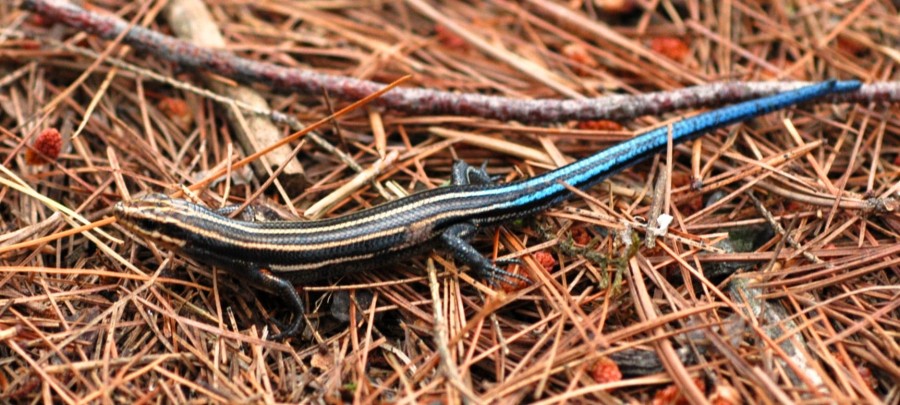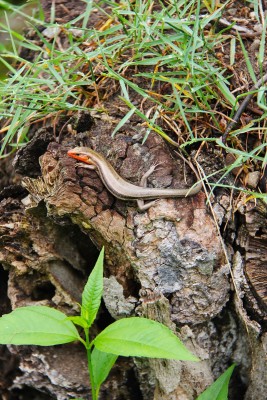
If you’ve ever seen a Five-lined Skink, you know just how neat they are!
The Five-lined Skink, which looks a bit like a salamander, is the only lizard species native to Ontario. And while researchers continue to study skinks, we still don’t know very much about what they do on a day-to-day basis, particularly from September to May when they’re hibernating.
Here are five cool things we DO know about Five-lined Skinks, courtesy of Alistair MacKenzie, Resource Management Supervisor at Pinery Provincial Park.
~
1. Where they live
In Ontario, you’ll find Five-lined Skinks in the Great Lakes-St. Lawrence region and along the Lake Erie shoreline. They live under rocks, fallen trees and leaves.
~
2. Skinks are solitary
Like frogs, they travel through life alone, getting together only when it’s time to mate in May and June.
The female lays up to a dozen eggs in a nest she makes under rocks or logs. But that’s as maternal as she gets! When the little skinks hatch about a month later, they’re on their own to forage for food and avoid predators.
~
3. Skinks add a splash of colour
Skinks start off life with a bright metallic blue tail and dark body with five light-coloured stripes that run from their snout to their tail.
As they age, their tail and body fades to a more uniform brown-grey. They grow to about 20 cm in length.

~
4. Skinks are diurnal (active during the day)
Skinks spend their time looking for crickets, flies, grubs, worms and spiders to eat and sunning themselves on rocks or tree limbs when they need to warm up.
They have keen senses of sight and smell, and can move very quickly, which helps them catch their prey.
~
5. Skinks are nifty escape artists
They have many natural enemies, including foxes, raccoons, snakes and birds of prey, BUT if a predator catches a skink by the tail, the tail can break off and thrash about! This distracts the predator, allowing the skink to escape. The tail will re-grow over time, but never as long as it was.
~
Skinks are an endangered species in Ontario

Both Five-lined Skink populations in Ontario are now listed on the Endangered Species Act.
Habitat loss is one reason for their inclusion on the list, but five-lined skinks are also threatened by motorists and people who collect them for the pet trade.
If you have information about poaching, please report it to the Ministry of Natural Resources and Forestry Tips Line.
~
Here’s how you can help:
Skinks are shy, but they’re friendly, and they need our help to survive.
You can:
- respect their habitat by not removing trees and fallen wood or cutting tall grass on your property
- stay alert and reduce your speed when driving a car or bicycle in areas where you know they live
- become a volunteer community scientist and help contribute to what we know about five-lined skinks by reporting where and when you see them


